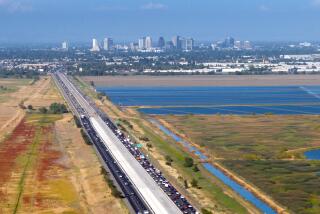U.S. highway trust fund veers toward crisis
WASHINGTON — Soaring gasoline prices are hurting Uncle Sam in the wallet too.
As motorists cut back on their driving and buy more fuel-efficient cars, the government is taking in less money from the federal gasoline tax.
The result: The principal source of funding for highway projects will soon hit a big financial pothole. The federal highway trust fund could be in the red by $3.2 billion or more next year.
The fund, set to finance about $40 billion in transportation projects next year, is increasingly strained. And the problem has taken on greater urgency as lawmakers face a backlog of projects to maintain the nation’s aging interstate highway system and ease traffic congestion.
“The situation has only been exacerbated by rising fuel prices, which are causing motorists to drive less and resulting in less revenue for transportation improvements,” said David Bauer, senior vice president for government relations at the American Road and Transportation Builders Assn.
California risks losing $930 million, or about a third of its federal highway allotment, Caltrans Director Will Kempton said in a letter to the state’s congressional delegation. Kempton warned that unless Washington acted to address the shortfall, projects could be delayed, reduced or canceled.
In the short run, lawmakers are scrambling to figure out how to close the gap. Federal highway spending nationwide could be cut by a third beginning Oct. 1, according to the American Road and Transportation Builders Assn.
“The condition of the highway trust fund has been deteriorating for years, but skyrocketing gas prices have made an already dire situation worse,” said Sen. Patty Murray (D-Wash.), head of the Senate transportation appropriations subcommittee. “We are now less than a year away from a bankrupt trust fund, which would leave critical construction projects in peril.”
In the long run, lawmakers must figure out whether the 18.4-cent-a-gallon federal gasoline tax, which helped bring in money when fuel-hungry SUVs were hot, is still a viable way to fund transportation projects amid heightened concern about gasoline prices, U.S. dependence on foreign oil and global warming.
The federal gasoline tax is tied to every gallon sold, not every dollar spent, so federal gas tax revenue goes up only if consumption increases. This year, consumption is projected to drop for the first time since 1991.
Vehicle miles traveled on the nation’s roads are trending downward for the first time since the oil shocks of the late 1970s and early 1980s, according to the Cambridge Energy Research Associates consulting firm.
Highway trust fund receipts were down more than $2 billion through May compared with the same period a year ago, a Treasury Department report said.
The shortfall was projected at $3.2 billion this year, but it is expected to be higher when the White House budget office issues a revised estimate this month. The shortfall was a major reason that Republican presidential candidate John McCain’s proposal for a gas tax holiday to ease the public’s pain at the pump faced bipartisan congressional resistance.
At the same time, California officials project a decline in revenue from the state’s 18-cent-per-gallon gasoline tax -- about $62 million less for transportation projects in 2008-09 from the record high of $2.842 billion in 2006-07.
But the state is expected to take in an additional $455 million in the new fiscal year because of a sales tax on gasoline that brings in more money as prices rise.
The federal highway trust fund faced problems even before the run-up in gas prices because of higher costs for asphalt, concrete and steel.
But its condition has been “exacerbated by the high price of fuel and people changing their driving habits,” said Stephen E. Sandherr, chief executive officer of the Associated General Contractors of America.
Lawmakers from both parties are eager to find a way to fund politically popular transportation projects. But one possible solution -- an increase in the gas tax, which was last raised in 1993 -- is considered unrealistic in an election year.
A proposal to shift $8 billion from the general fund to the highway trust fund has considerable support in the Senate. But it faces opposition from a number of Republicans who say it would trade one problem for another by deepening the federal budget deficit.
Reps. Jerry Lewis of Redlands and Paul D. Ryan of Wisconsin, the top Republicans on the House Appropriations and Budget committees, respectively, said in a statement that the transfer “would do nothing to solve the fundamental problems with the trust fund, leading the way for further massive spending down the road when the funding runs out again.”
President Bush proposed shifting cash from mass transit to highways, which ran into opposition in Congress because commuters are increasingly turning to bus and rail lines because gas costs too much.
But Murray said: “Without a fix soon, we could face having to cut all federal highway funds by a third simply to keep the trust fund solvent. That is the last thing we should be doing when infrastructure needs are up, construction jobs are down and Americans are struggling through tough economic times.”
--
More to Read
Sign up for Essential California
The most important California stories and recommendations in your inbox every morning.
You may occasionally receive promotional content from the Los Angeles Times.











